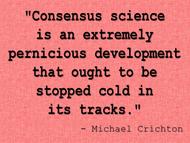Defending Climate Orthodoxy
- By:
- Edward A. Reid Jr.
- Posted On:
- Jan 9, 2018 at 6:42 AM
- Category
- Climate Change
scientific method: principles and procedures for the systematic pursuit of knowledge involving the recognition and formulation of a problem, the collection of data through observation and experiment, and the formulation and testing of hypotheses.
One of the most egregious aspects of the activities exposed by the Climategate e-mails was the concerted effort to deter publication of scientific papers which questioned the climate orthodoxy of the consensed climate science community and prevent inclusion of those papers in the IPCC reports. Despite their discovery as the result of Climategate, these activities have continued unabated. While the consensed climate science community has been unsuccessful in preventing publication of scientific papers critical of the climate orthodoxy, it has been successful in keeping most of them from publication in the premier scientific journals in the US and Europe; and, it has been successful in suppressing media attention to the studies.
There were more than 500 scientific papers supportive of some aspect of climate skepticism published in 2016. More than 400 such papers have been published in 2017. (Interestingly, a search for this article produced a SNOPES “Fact Check” as the first result.) These papers have received little or no attention in the US media, largely as the result of their publication in secondary journals; and, as the result of the absence of promotion by the consensed climate science community.
The attention of the US media is primarily focused on the results of government funded studies involving the use of unverified climate models to create scare scenarios. The study authors, the journals in which they publish and the government agencies which fund their studies are conscientious in their efforts to attract media attention; and, the “if it bleeds, it leads” media are all too anxious to cooperate.
The ability of members of the consensed climate science community to suggest potential peers to participate in peer review of their scientific studies, generally to the exclusion of skeptical reviewers, has reportedly degenerated into a system of “pal review”. This has been accompanied by an unwillingness on the part of members of the consensed climate science community to review scientific papers by skeptics of the climate orthodoxy; and, by submission of persistent critical reviews of skeptical papers.
One of the most active areas of skeptical climate research is the study of the sensitivity of the climate to increasing atmospheric CO2 concentrations, which the consensed climate science community has identified as the “control knob” of global climate. Numerous skeptical climate scientists question this view of CO2, referring to it as a “fallacy”. Several recent studies have suggested climate sensitivities to CO2 significantly lower than the range of values used by the IPCC.
The continued divergence of the Climate Model Intercomparison Project Phase 5 (CMIP5) climate model scenarios from the observed global temperatures have caused members of the consensed climate science community to acknowledge that there are problems with the climate models, including excessive sensitivities ascribed to the “control knob”.
In summary, the “settled science” might not be “settled” after all; and, the climate orthodoxy might not be as orthodox as we have been asked to believe.


